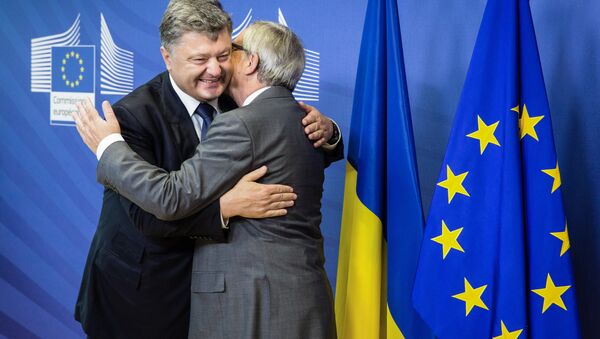The analysis from the European Court of Auditors (ECA) found that despite significant impetus for reform in Ukraine, only "fragile" results were achieved through the EU's assistance program.
"EU support for Ukraine remains a work in progress, despite good efforts by the Commission", said Szabolcs Fazakas, member of the European Court of Auditors responsible for the report.
EU support for #Ukraine remains a work in progress, despite good efforts by @EU_Commission. Further steps needed. https://t.co/W4Lctm0hCO pic.twitter.com/pjS3JVhSWP
— EU Court of Auditors (@EUauditors) December 7, 2016
The report, which looked into public finance management and anti-corruption measures between 2007 and 2015, found while there had been a commitment to reform Ukrainian governance, there was a severe lack of follow through.
"At the time of our audit, there was a strong political commitment to public administration reform. But management changes jeopardized the reforms and low salaries created openings for corruption. Further steps are needed to meet objectives," Fazakas added.
EU audit report: EU assistance to #Ukraine: results so far are “fragile”, say @EUauditors https://t.co/UZ5ntAiZyO pic.twitter.com/LDVTdK07ok
— EU Court of Auditors (@EUauditors) December 7, 2016
The report noted that Ukraine's political crisis, which featured the 2014 Euromaidan protests and eventual overthrow of Viktor Yanukovich's government, was among the issues that severely hampered the effectiveness of EU funding.
"Over most of the period audited, the unstable political, legislative and administrative context limited the effectiveness of EU assistance," the auditors wrote.
EU: We Don't Know How the Money Was Spent
Chief among concerns in Ukraine remains corruption and the influence of oligarchs on the country and its governance.
Speaking to reporters about the report, Fazakas admitted that there was no chance of analyzing how budget support funds had actually been spent in Ukraine, saying: "we can only control that the transfer took place."
.@jensstoltenberg: #NATO "taking all necessary measures" to make sure aid to #Ukraine goes to right places, incl fighting corruption #FORMIN
— Teri Schultz (@terischultz) December 7, 2016
As part of EU support, the commission announced plans in 2014 to provide Ukraine with a US$12 billion (€11.2 billion) support package to rescue the country's finances, which included loans from the European Investment Bank (EIB) and the European Bank for Reconstruction and Development (EBRD) to help with the ongoing reforms process.
Mogherini: the #EU is working very hard to support #Ukraine, especially in economic, social and corruption reforms. Also security reform.
— Matthew Bodner (@mattb0401) December 6, 2016
However, Fazakas said that this budget support did not allow for EU control over how the funds were spent and how various reform programs were implemented, raising concerns about the use of EU funds in Ukraine.
"There was an urgency on paying [budget support], in cooperation with IMF, to save Ukraine", Fazakas said, adding that once the funding had been provided, it was "very hard to ask for a right implementation of the program."


